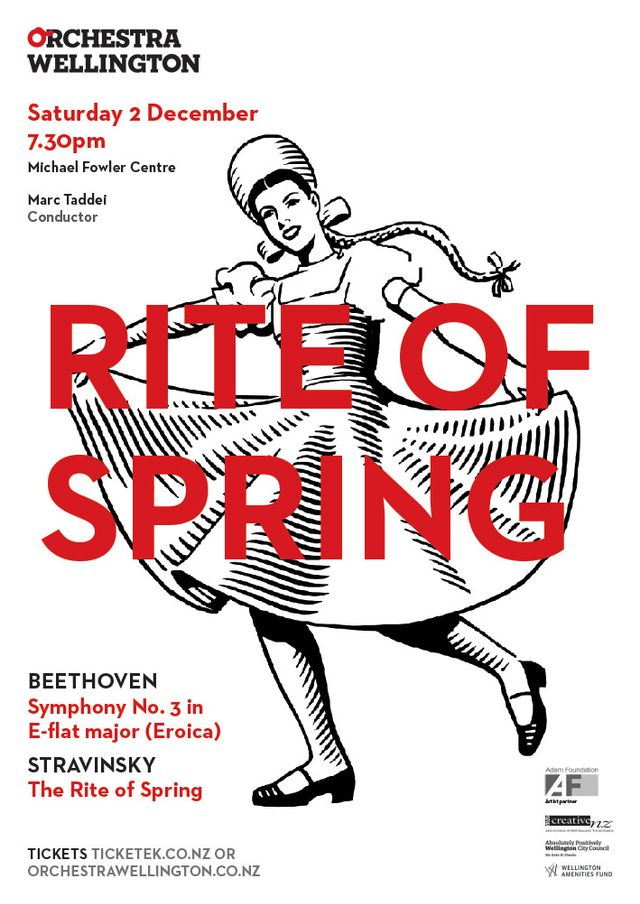Music / November 2017
December 2017 | October 2017-
-

Orchestra Wellington presents RITE OF SPRINGTwo works that...
- Orchestra Wellington
- Orchestra Wellington presents RITE OF SPRING Two works that changed the course of musical history SATURDAY DECEMBER 2, 7:30PM MICHAEL FOWLER CENTRE, WELLINGTON Ludwig van Beethoven Symphony No 3 in E-flat Major, Op 55 “Eroica” Igor Stravinsky The Rite of Spring Marc Taddei, Conductor Orchestra Wellington’s 2017 season goes out with a bang, in a concert combining two of the greatest pieces of music ever written, conducted by music director Marc Taddei. First, Beethoven’s mighty Eroica Symphony features on Saturday 2nd December at the Michael Fowler Centre. At the other end of the concert, the orchestra is performing the one work which can top Beethoven’s in terms of its impact, Stravinsky’s Rite of Spring. “I’m extraordinarily excited to present the defining works of the 19th and 20th century for our grand finale concert,” says conductor Marc Taddei. “Music would never be the same after the Eroica and The Rite of Spring. The sense of drive, power and rhythmic impulse connect these two monuments of Western civilisation.” Beethoven’s Eroica caused a sensation when it was first performed in 1803, a hundred years later, Stravinsky’s Rite of Spring started a riot. Beethoven demanded the orchestra play a series of discords so shocking to audiences, many of them thought he had gone mad. No longer was music just for aristocrats, or the church, with the Eroica symphony, Beethoven created something to take on the world. The crowning work of his triad of ballet masterpieces, Stravinsky’s Rite of Spring, about a girl chosen to dance herself to death in a pagan sacrifice, sounds as fresh now, as it did a century ago. Paris audiences knew to expect the unexpected from Diagilev’s Ballets Russes, but the Rite was beyond anything they had imagined. With exotically primitive melodies, irregular rhythms and brutal harmonies, the orchestra is pushed to its technical limits. And despite the modern rhythms and harmonies, audiences find Stravinky’s music irresistible. The tentative, questioning woodwind fragments that open the work, the brutal asymmetric stomping rhythms of the first dance, the deep, grinding harmonies that seemed to come from the earth itself, and the virtuosic sacrificial dance at the end: all combine to make a music more carnal, primitive and instinctive than any ballet before. Now the Rite of Spring is one of the most popular ballets ever, and always a sensation whenever it is performed. This is Orchestra Wellington’s biggest concert of the year, and it also marks the full launch of its 2018 season. Music Director Marc Taddei has hinted at the programmes for next year, but at this concert, all will be revealed. To secure your seats head to TICKETEK.CO.NZ
- Accepted from Orchestra Wellington posts by feedreader
- Automatically tagged as:
- music
-
-
-

Orchestra Wellington presents RITE OF SPRINGTwo works that...
- Orchestra Wellington
- Orchestra Wellington presents RITE OF SPRING Two works that changed the course of musical history SATURDAY DECEMBER 2, 7:30PM MICHAEL FOWLER CENTRE, WELLINGTON Ludwig van Beethoven Symphony No 3 in E-flat Major, Op 55 “Eroica” Igor Stravinsky The Rite of Spring Marc Taddei, Conductor Orchestra Wellington’s 2017 season goes out with a bang, in a concert combining two of the greatest pieces of music ever written, conducted by music director Marc Taddei. First, Beethoven’s mighty Eroica Symphony features on Saturday 2nd December at the Michael Fowler Centre. At the other end of the concert, the orchestra is performing the one work which can top Beethoven’s in terms of its impact, Stravinsky’s Rite of Spring. “I’m extraordinarily excited to present the defining works of the 19th and 20th century for our grand finale concert,” says conductor Marc Taddei. “Music would never be the same after the Eroica and The Rite of Spring. The sense of drive, power and rhythmic impulse connect these two monuments of Western civilisation.” Beethoven’s Eroica caused a sensation when it was first performed in 1803, a hundred years later, Stravinsky’s Rite of Spring started a riot. Beethoven demanded the orchestra play a series of discords so shocking to audiences, many of them thought he had gone mad. No longer was music just for aristocrats, or the church, with the Eroica symphony, Beethoven created something to take on the world. The crowning work of his triad of ballet masterpieces, Stravinsky’s Rite of Spring, about a girl chosen to dance herself to death in a pagan sacrifice, sounds as fresh now, as it did a century ago. Paris audiences knew to expect the unexpected from Diagilev’s Ballets Russes, but the Rite was beyond anything they had imagined. With exotically primitive melodies, irregular rhythms and brutal harmonies, the orchestra is pushed to its technical limits. And despite the modern rhythms and harmonies, audiences find Stravinky’s music irresistible. The tentative, questioning woodwind fragments that open the work, the brutal asymmetric stomping rhythms of the first dance, the deep, grinding harmonies that seemed to come from the earth itself, and the virtuosic sacrificial dance at the end: all combine to make a music more carnal, primitive and instinctive than any ballet before. Now the Rite of Spring is one of the most popular ballets ever, and always a sensation whenever it is performed. This is Orchestra Wellington’s biggest concert of the year, and it also marks the full launch of its 2018 season. Music Director Marc Taddei has hinted at the programmes for next year, but at this concert, all will be revealed. To secure your seats head to TICKETEK.CO.NZ
- Accepted from Orchestra Wellington posts
- Automatically tagged as:
- music
-
-
-

SONGS OF MOANAOrchestra Wellington & Te VakaMichael Fowler...
- Orchestra Wellington
- SONGS OF MOANA Orchestra Wellington & Te Vaka Michael Fowler Centre, Saturday 14 July, 2018, 2:00pm 2018, ORCHESTRA WELLINGTON will be joined by the acclaimed South Pacific ensemble TE VAKA to perform ‘We Know The Way’, 'How Far I Go’ and all your other favourites from Disney’s hit movie MOANA.
- Accepted from Orchestra Wellington posts
- Automatically tagged as:
- music
-